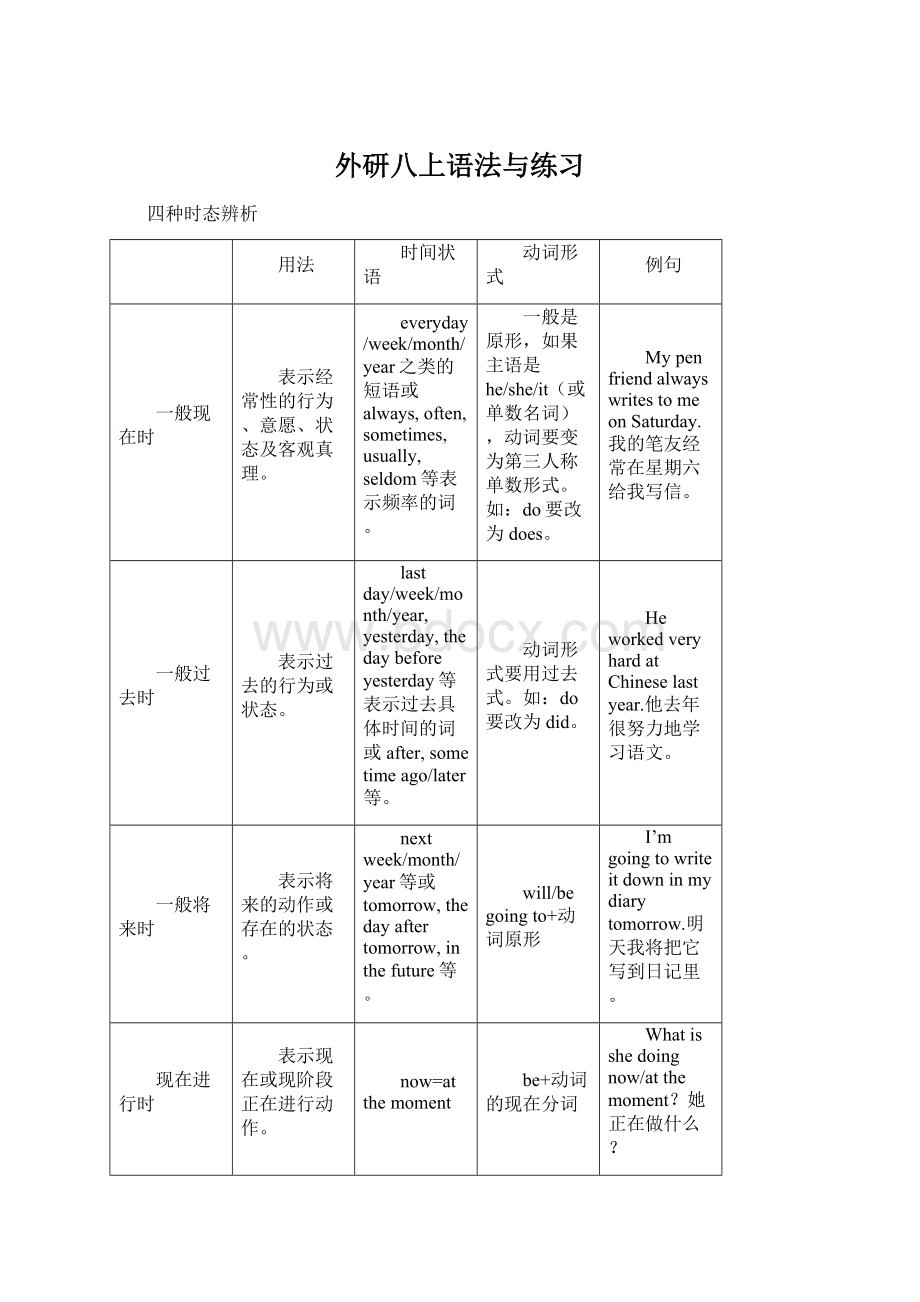外研八上语法与练习.docx
《外研八上语法与练习.docx》由会员分享,可在线阅读,更多相关《外研八上语法与练习.docx(14页珍藏版)》请在冰豆网上搜索。

外研八上语法与练习
四种时态辨析
用法
时间状语
动词形式
例句
一般现在时
表示经常性的行为、意愿、状态及客观真理。
everyday/week/month/year之类的短语或always,often,sometimes,usually,seldom等表示频率的词。
一般是原形,如果主语是he/she/it(或单数名词),动词要变为第三人称单数形式。
如:
do要改为does。
MypenfriendalwayswritestomeonSaturday.我的笔友经常在星期六给我写信。
一般过去时
表示过去的行为或状态。
lastday/week/month/year,yesterday,thedaybeforeyesterday等表示过去具体时间的词或after,sometimeago/later等。
动词形式要用过去式。
如:
do要改为did。
HeworkedveryhardatChineselastyear.他去年很努力地学习语文。
一般将来时
表示将来的动作或存在的状态。
nextweek/month/year等或tomorrow,thedayaftertomorrow,inthefuture等。
will/begoingto+动词原形
I’mgoingtowriteitdowninmydiarytomorrow.明天我将把它写到日记里。
现在进行时
表示现在或现阶段正在进行动作。
now=atthemoment
be+动词的现在分词
Whatisshedoingnow/atthemoment?
她正在做什么?
语法专练
一、用所给词的适当形式填空。
1.I____(watch)thefootballgameonTVtomorrowevening.
2.Thegirl_____(count)theapplesonthetablenow.
3.Healways_____(repeat)thesameword.
4.Hisfriend_____(send)himanemaillastSaturday.
5.Thelittleboy_____(correct)thespellingmistakesinhisnotebooklastnight.
二、按要求改写下列句子,每空一词。
1.TheygavesomeconcertsinChinalastyear.(改为否定句)
Theygave_______________concertsinChinalastyear.
2.Hecheckedhisvocabularynotebookeveryday.(改为一般疑问句)
______he_______hisvocabularynotebookeveryday?
3.Shelookedworriedbecauseshedidn’tpasstheEnglishexam.(对划线部分提问)____________she______worried?
4.Therewasaclassmeetingyesterdaymorning.(用tomorrow改写句子)There__________aclassmeetingtomorrow.
5.Hesometimesplaysbasketballwithhisgoodfriends.(用now改写句子)_________basketballwithhisgoodfriendsnow.
语法专练
一、1.amgoingto/willwatch
2.iscounting
3.repeats4.sent5.corrected
二、1.didn’tgiveany2.Does,check3.Whydid,look4.willbe
5.He’splaying
【语法讲堂】
现在完成时
(一)
如果你想说“我已经看过某部电影,所以不想看了”、“某人曾经做过什么事情”等等,该如何表达呢?
首先请看下面的句子:
(1)Ihaveseenthefilm.Idon’twanttoseeitagain.这部电影我已经看过了,不想再看了。
(2)Haveyoueverlookedatatravelbrochure?
你看过旅游宣传册吗?
以上句子的谓语动词有一个共同的特点就是“have/has+动词的过去分词”,用于表示在以前的某个时间曾经做过的、发生的事情,这种行为对目前有某种影响,如
(1);还可以表示到目前为止曾经经历或没经历的事情,如
(2)。
我们把这种时态称为“现在完成时”。
从以上例句中我们也看到现在完成时的疑问句表达方式,由此可以推出现在完成的肯定句、否定句、疑问句及其答语。
人称
肯定
否定
疑问
回答
第一人称
Ihaveseenaboyintheroom.
Ihaven’t(havenot)seenaboyintheroom.
Haveyouseenaboyintheroom?
Yes,Ihave.
No,Ihaven’t.
第二人称
YouhavebeentoEngland.
Youhaven’t(havenot)beentoEngland.
HaveyoubeentoEngland?
Yes,wehave.
No,wehaven’t.
第三人称
He/ShehasbeentoDisneylandinLosAngeles.
He/Shehasn’t(hasnot)beentoDisneylandinLosAngeles.
Hashe/shebeentoDisneylandinLosAngeles?
Yes,he/shehas.
No,he/shehasn’t.
Theyhaveplayedconcertsallovertheworld.
Theyhaven’t(havenot)playedconcertsallovertheworld.
Havetheyplayedconcertsallovertheworld?
Yes,theyhave.
No,theyhaven’t.
【语法专练】
一、用所给动词的适当形式填空。
1._________youever_______(write)toyourfriendinEnglish.
2.She________(give)concertsallovertheworld.
3.They_________(see)thefilm.Theydon’twanttoseeitagain.
4.David_______(take)manyphotosofstoneanimalsbefore.
5.Daming_________(nottry)skiingbefore.
二、按要求改写下列句子,每空一词。
1.Tonyhaswashedhisclothes.(改为否定句)
Tony____________hisclothes.
2.WehaveeverbeentoShanghai.(改为否定句)
Wehave____________toShanghai.
3.Ihaveswuminthesea.(改为一般疑问句,并作肯定回答)
----_________you__________________inthesea?
----_________,I___________.
4.MyparentshavevisitedTian’anmenSquare.(改为一般疑问句,并作否定回答)
----_________yourparents_________Tian’anmenSquare?
----No,________________.
5.Sheatetwoapplesyeasterday.(改为现在完成时)
She________ever_________twoapples.
三、单项选择。
1.HasJohn_________Beijing_______Shanghai?
A.leaving;toB.left;toC.left;forD.leaving;for
2.Ithinkifyou’velostthelibrarybook,youmust_________it.
A.payforB.payC.spendonD.take
3.---Haveyou________yourkey?
---No,I’ve_______foriteverywhere,butIcan’tfingit.
A.find;lookedB.looked;foundC.found;lookedD.looked;looked
4.I’ve________metherbefore,soIdon’tknowher.
A.neverB.everC.justD.yet
5.---Couldyou_____meyourbike?
---Sorry,Tom_____italready.
A.borrow;haslentB.borrow;lendC.lend;hasborrowed
D.lend;borrow
语法专练
一、1.Have,written2.hasgiven3.haveseen4.hastaken45.hasn’ttried
二、1.hasn’twashed2.neverbeen3.Have,everswum;Yes,have
4.Have,visited;theyhaven’t5.has,eaten
三、1----5CACAC
现在完成时
(二)
例句
构成
have(has)
+过去分词
Wehavevisitedyourschoolbefore.我以前曾去过你们学校。
用
法
结束、结果:
表示现在刚完成的动作。
LiMinghasjustturnedoffthelight.李明刚刚把灯关上。
(现在灯关上了)
Ihavelostmypen.我把笔丢了。
(过去某时丢的,现在我还没找到这支笔)
常搭配的副词:
already,yet,just,ever,never。
这几个词yet常在句首或者句尾,其余的常在have/has的后面,行为动词的前面。
already也可在肯定句尾,表示强调,在疑问句末尾表示惊讶等。
Hashefinishedhishomeworkalready?
对他完成了作业感到惊讶。
另,before也可以与现在完成时连用,ago只能与过去时连用。
I’veeverbeentherebefore.Itwastenyearsago.
Hashefinishedhishomeworkyet?
havebeento与havegoneto
1.来过,去过,到过某地,(人已经回来)显著标志:
ever,never,twice,threetimes,before.
2.去或到某地了(人还没有回来)
显著标志:
类似以下的句子时,要用
havegoneto。
Hewillcomebacknextweek.
Heisn’there/there/athome.注意一般用
havegoneto的大都是第三人称
3.注意遇到四个地点副词要去掉to这四个地点副词是here,there,home,abroad。
语法专练
一、单项选择。
1.—_______you_______yourhomework?
----Yes,Ihave.
A.Do;doneB.Did;doC.Have;done D.Have;do
2.----_______you_____toXi’an?
---Yes.Iwenttherelastmonth.
A.Did;wentB.Are;going C.Have;gone D.Have;been
3.XiaoYong_______hisuncleinAustralianextmonth.
A.willsee B.sees C.hasvisited D.wantedtosee
4.---IsyourmotherinNewYork?
---No,she________Ameraca.
A.hasnevergonetoB.hasnevergone C.hasneverbeento D.hasneverbeen
5.I________already_____alettertoMrSmith.Whataboutyou?
A.was;writing B.have;writtenC.am;writing D.had;written
6.----Whydoyoustandoutsideyourroom?
----BecauseI__________mykeyinit.
A.haveforgetB.haveforgottenC.haveleaveD.haveleft
7.—Whenwillyoudoyourwork?
—I______just_____it.
A.have;done B.was;done C.was;doingD.is;doing
8.You_________aroundtheworld.Let’sstartnextweek.
A.havetravelled B.haven’ttravelledC.don’thavetravelled
D.aretravelling
9.----Hasyoursisterseenthefilm?
---Yes.She______ittwodaysago.
A.didB.haveseenC.sawD.sees
10.He_________tothespacestationandhewillreachthereoneday.
A.been B.hasbeen C.hasn’tgone D.hasgone
二、根据汉语完成句子。
1.美好的旧时光已经悄然而去。
Thegoodoldtime_________________quietly.
2.这个运动员已经获得了三枚金牌。
Theathlete________already________threegoldmedals.
3.他为英国广播公司工作过。
He________ever_________fortheBBC.
4.我刚给布什总统写了一封信。
I_________just________toPresidentBush.
5.你从未见过真的宇宙飞船吗?
_________younever_________arealspaceraft?
语法专练
一、1---5CDACB6----10DABCA
二、1.hasgone2.has;got3.has;worked4.have;written
5.Have;seen
【语法讲堂】
现在完成时(三)
1.与介词for或since连用
表示某个动作或者某个状态从过去某一时间开始一直持续到现在(包括现在在内),我们可以用现在完成时。
Hehaslivedherefor30years.
他住在这儿三十年了。
(现在还住在这儿)
They'veknowneachothersincechildhood.
他们从小彼此相识。
(现在还继续往来)
HowlonghaveyoustudiedEnglish?
你学英语多久了?
(现在仍在学)
由以上例句可以看出,在表示行为或状态从过去一直持续到现在时,要与表示一段时间的时间状语连用,常用的是for或since引导的时间状语。
注意
(1).since+时间点或者从句,而for+一段时间。
Sincelastyear,since1997.since8o’clockam,sincefivedaysago.fortenyears,foranhour
(2).对这类时间状语提问要用howlong。
(但howlong开始的问句动词要用延续性动词,时态可不限。
如Howlongdidhestaythere?
Howlongwillhestaythere?
)
MrBlackhaslivedinChinasince2000.(从2000年至今还在中国)
比较:
MrBlacklivedinChinain2000.(反正2000年在中国,到底2000年后呢?
不得而知)
*在这种用法中,要与一段时间连用,动词必须是延续性的,非延续性的动词只能在否定句中出现,或者变成延续性的动词后也可以。
Wehaven’tseeneachotherforsomedays.See为瞬间性的动词,但在否定句中也可以和somedays一段时间连用。
2.现在完成时和一般过去时的区别
用法
例句
现在完成时
现在完成时强调的是过去发生的动作对现在造成的影响或者结果,强调现在的情况或者状态,与过去没有关系。
不能和表示过去的时间状语连用。
Ihaveseenthefilmalready.(现在我已经了解这部电影的内容了,至于什么时候看的没有关系,反正我已看过了。
)
一般过去时
一般过去时只表示这动作是在过去某个时间发生的,或者说是过去某个时间发生了某个动作而已,和现在没有关系。
可以和表示过去的时间状语连用。
Isawthefilmlastyear.(只是表示我是去年看的这部电影。
)
常用的过去时间状语:
yesterday,justnow,lastyear,in2000,someminutesago,thedaybeforeyesterdayetc.
【语法专练】
一、选用never,already,yet,since或for完成句子。
1.Hehas_______readthebooktwice.
2.Haveyouworkedonthefarm__________threeyearsago?
3.---Haven’tyouhadyourbreakfast_________?
---Yes,Ihave.
4.TheWangshavelivedintheoldhouse______aboutthirtyyears.
5.Thelittleboyhas________seenhismother,sohedoesn’tknowher.
二、根据所给单词或汉语提示,用其适当的形式完成句子。
1.---Howmanyschools______ProjectHope______since1989?
(build)
---Sorry,Idon’tknow.
2.MissLiu_________usEnglishlastterm.(teach)
3.Thestudents_________intheschoolsincetwoyearsago.(study)
4.---Howlong________you________thecomputer?
---Forhalfayear.(买)
5.They_________hereforfiveminutes.(离开)
三、单句改错。
1.Sofarwelearnedabout2,000Englishwords.
2.Weiminghasjoinedasoldierfortwoyears.
3.MaryhasnevergonetoCanada.
4.MyfatherhasbeeninJi’nanthreedaysago.
5.Hehaswrittenthebooksince2004ago.
语法专练
一、1.already2.since3.yet4.for5.never
二、1.has,built2.taught3.havestudied4.have,had5.havebeenaway
三、1.learned---havelearned2.joined---been3.gone---been
4.hasbeen—went5.去掉ago
【语法讲堂】
反意疑问句
例句
定义
又叫附加疑问句,指当提问的人对前面所叙述的事实不敢肯定,需要向对方加以证实时所提出的问句。
YouhavebeentoBeijing,haven’tyou?
你去过北京,是吗?
构成
a.“前肯定后否定,前否定后肯定”。
b.反问句的主语必须是代替主语的代词.
c.反问句的谓语动词在时态和人称上要与前面谓语动词一致.
1)陈述部分有be、情态动词、助动词,反问部分用相应的词。
2)陈述句部分谓语为行为动词时,反问句根据时态用相应的助动词do/does/did。
3)陈述部分有hardly,never,few,little,等否定词时,反问部分要用肯定式。
Shewasnotathomeatthattime,wasn’tshe?
Thegirlscanplaytheviolin,can’tthey?
ShehasbeentheresinceJune,hasn’tshe?